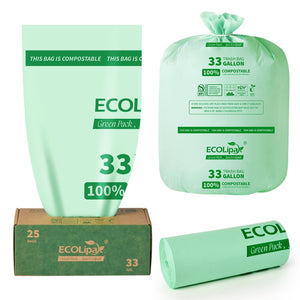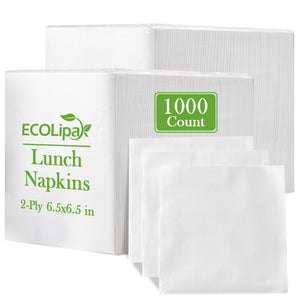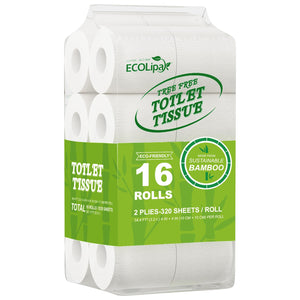You want a cleaner home and a healthier planet. Choosing the right compostable bag matters. Certified options like ASTM D6400 or EN 13432 make your efforts count. Ecolipak leads the way with eco-friendly packaging. The market for compostable bags is booming, so match your choice to your needs—kitchen, yard, or pet waste.
Key Takeaways
-
Choose certified compostable bags like ASTM D6400 or EN 13432 to ensure they break down safely and support a cleaner environment.
-
Switching to compostable bags reduces landfill waste and helps create nutrient-rich soil, benefiting both your home and the planet.
-
Look for trusted brands like Ecolipak, BioBag, and HEMCBags that offer durable, eco-friendly options for kitchen, yard, and pet waste.
Best Compostable Bags Overview
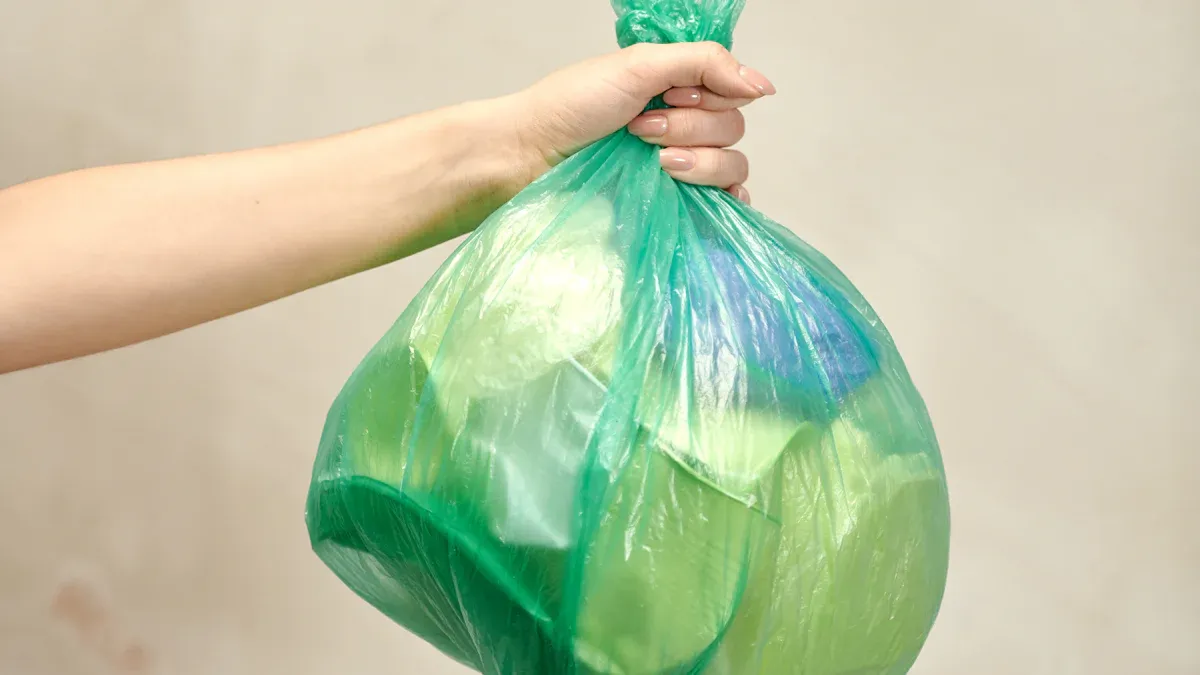
Top Picks for 2025
You want the best compostable trash bags for your home, yard, or business. In 2025, several brands stand out for their quality and eco-friendly features. When you choose compostable trash bags, look for these criteria:
|
Criteria |
Description |
|---|---|
|
Material Quality & Durability |
Strong, renewable materials that prevent leaks and tears. |
|
Certifications and Compliance |
Trusted standards like ASTM D6400 and EN 13432. |
|
Customization & Product Range |
Sizes and designs for every need, from kitchen to yard. |
|
Supply Chain Reliability |
Consistent quality and timely delivery. |
|
Cost-Effectiveness |
Good value for families and businesses. |
Key Benefits of Compostable Bags
Switching to compostable trash bags brings real benefits to your family and the planet. You help keep your home clean and support a healthier environment.
|
Feature |
Compostable Bags |
Plastic Bags |
|---|---|---|
|
Material Composition |
Made from plants, break down into organic matter. |
Made from petroleum, hard to decompose. |
|
Biodegradability |
Decompose in months under the right conditions. |
Stay in landfills for centuries. |
|
Environmental Impact |
Lower pollution, reduce methane, and protect wildlife. |
Harm animals and pollute water. |
Compostable trash bags also help reduce landfill waste. They break down quickly, improve soil health, and support a circular economy. You make a positive impact every time you use them at home.
Compostable Bags Explained
What Makes a Bag Compostable
You might wonder what sets a compostable bag apart from regular trash bags. Compostable bags use plant-based materials that break down safely in composting environments. These materials come from renewable sources, so you help the planet every time you toss one in your compost bin. Here’s a quick look at what goes into making these bags:
|
Material |
Source/Description |
Breakdown Process |
|---|---|---|
|
Corn |
Derived from corn crops, often used in starch blends |
Decomposes in composting environments without toxins |
|
Sugarcane |
A renewable resource, also used in starch blends |
Breaks down naturally in compost |
|
Potato Starch |
Sourced from potatoes, biodegradable properties |
Fully decomposes in composting conditions |
|
Cellulose |
Derived from wood pulp or plant fibers |
Breaks down into natural elements in compost |
|
Cassava Starch |
Sourced from cassava, renewable nature |
Decomposes safely in composting environments |
|
Polylactic Acid (PLA) |
Bioplastic from fermented plant starch |
Fully decomposes in composting environments |
|
Polyhydroxyalkanoates (PHA) |
Microbial fermentation of carbon-rich feedstocks |
Breaks down naturally in composting conditions |
To be truly compostable, a bag must meet strict standards. You should look for certifications like ASTM D6400, EN 13432, or BPI. These standards guarantee that the bag will break down completely and safely, leaving no harmful residue.
Sustainability Impact
Switching to compostable bags brings real change to your home and community. You help reduce landfill waste because compostable bags let you collect organic scraps together. This means less trash piling up and more nutrients going back into the soil. Here are some big benefits:
-
Reduced landfill waste keeps your neighborhood cleaner.
-
Lower carbon footprint means you support a healthier planet for your family.
-
Composting organic waste with compostable bags helps prevent methane emissions, which are much worse for the environment than carbon dioxide.
When you choose compostable bags, you make a smart choice for your family’s health and the world around you. You support cleaner air, richer soil, and a future where green living feels easy and rewarding. 🌱
Compostable Bags by Use
Kitchen Compostable Trash Bags
You want your kitchen to stay clean and green. Compostable garbage bags make it easy to collect food scraps and keep odors away. You can choose from several top brands that work well for kitchen use:
-
HoldOn bags use PBAT, PLC, and corn starch. They feel strong and safe for the environment.
-
Biodegradable Trash Bags break down fast and contain no polyethylene. You get a fully compostable bag, but sometimes they decompose too quickly when you add food scraps.
-
Countertop Bin Liners are strong and BPI certified. They fit small bins and help you manage compostable food waste. If you leave food inside too long, they may leak.
-
Primode bags are thick and leak-proof. You get eco-friendly performance, though they use bioplastics.
Tip: Always check for certifications like BPI or EN 13432. Certified compostable trash bags help you keep your kitchen zero-waste and healthy for your family.
Yard Compostable Garbage Bags
Yard work can get messy, but compostable garbage bags keep things tidy and eco-friendly. You want bags that handle leaves, grass, and branches without tearing. Here’s what makes the best yard compostable garbage bags stand out:
|
Feature |
Description |
|---|---|
|
Certified Compostable Material |
Bags meet strict U.S. and international composting standards. |
|
Worm Safe |
Non-toxic design keeps composting environments and worm habitats safe. |
|
Convenient Design |
Fits large yard bins for easy handling of yard waste. |
|
Enhanced Durability |
Puncture and tear resistance (thickness: 0.98 mils) for daily use. |
|
Odor and Pest Mitigation |
Contains odors and deters pests. |
|
Versatile Composting Options |
Works for home, curbside pickup, and industrial composting. |
|
Suitable for Trash Disposal |
Handles regular waste too, so you get utility and sustainability. |
You can toss yard waste in these compostable garbage bags and know you’re helping the planet. Your yard stays clean, and you support zero-waste living.
Pet Waste Compostable Bags
If you have pets, you know how important it is to keep your walks clean and odor-free. Compostable garbage bags for pet waste make this easy. You can choose from several trusted brands:
-
G.A.S. Certified Home Compostable Dog Poop Bags use cornstarch-based bioplastics. They’re easy to use and durable.
-
Pogi’s Compostable Dog Poop Bags come with handles and fit all dog sizes. They’re certified for composting.
-
Pet N Pet Compostable Poop Bags are known for their durability and eco-friendliness.
-
beyondGREEN Dog Waste Bag Refill Rolls work well in real-world conditions and make cleanup simple.
Note: Compostable garbage bags for pet waste help you keep parks and sidewalks clean. You support zero-waste habits every time you use them.
Ecolipak 1 Gallon Eco-friendly Dog Poop Bags
You want a compostable bag that’s easy to carry and gentle on the environment. Ecolipak’s 1 Gallon Eco-friendly Dog Poop Bags with Dispenser give you just that. These bags use biodegradable plant-based materials and come EN13432 certified. You get a leak-proof, tear-resistant design that keeps your hands clean. The lavender scent helps mask odors, so your walks stay fresh.
Each bag measures 9 x 13 inches, giving you plenty of space for waste. The included dispenser makes it easy to grab a bag when you need it. You can trust these compostable garbage bags to support your zero-waste lifestyle and keep your neighborhood clean.
Families and pet owners love Ecolipak because it combines convenience, sustainability, and health. You make a positive impact every time you use these compostable garbage bags.
Shopping and Produce Compostable Bags
You can bring home groceries and fresh produce without plastic waste. Compostable garbage bags for shopping and produce come in many sizes and certifications. Here’s a quick look at what’s available:
|
Product Description |
Count |
Capacity |
Price |
|---|---|---|---|
|
14 x 18" Compostable Produce Bags |
1000 bags |
N/A |
$48.93 |
|
Extra Large Compostable Shopping Bags |
500 Count |
30 Lbs |
$69.93 |
|
Large Compostable Shopping Bags |
500 Count |
20 Lbs |
$58.93 |
|
Medium-size Compostable Shopping Bags |
500 Count |
20 Lbs |
$48.93 |
|
14 x 18" Compostable Produce Bags |
250 Bags |
N/A |
$19.93 |
|
Large Compostable Shopping Bags |
200 Count |
20 Lbs |
$19.93 |
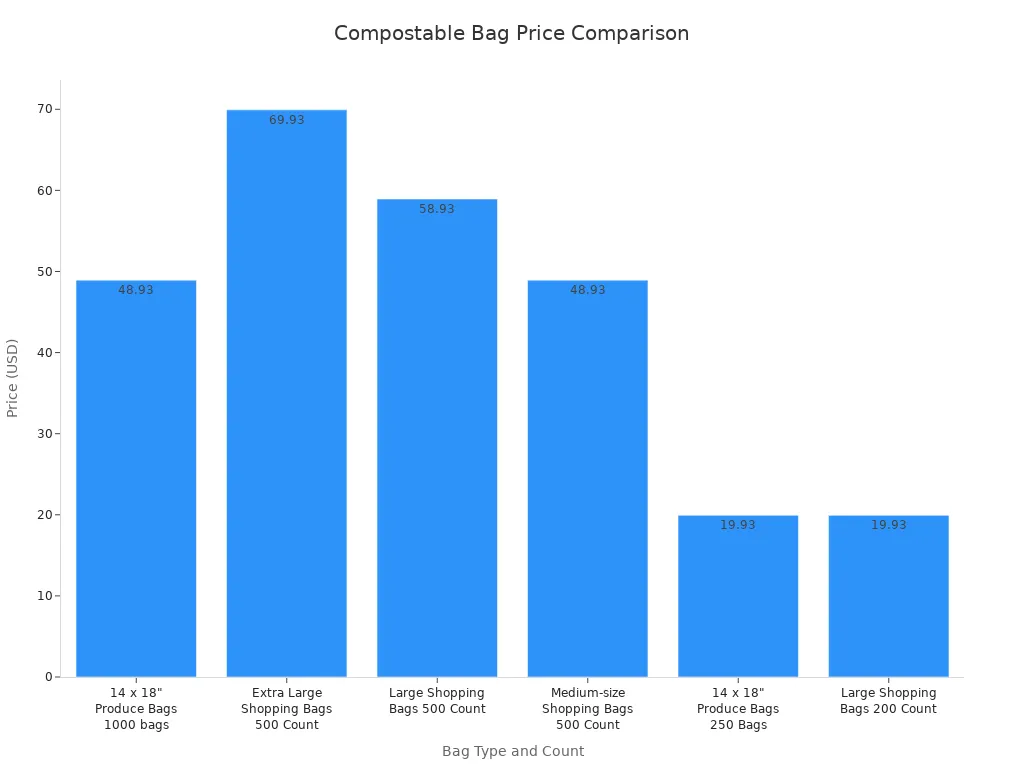
You can look for certifications like BPI, OK compost HOME & INDUSTRIAL, CMA, Cedar Grove, DEBIO, ASTM-D6400, ASTM-D6868, CAN/BNQ 0017-088, EN 13432, and Seedling. These compostable garbage bags help you shop with confidence and support zero-waste goals.
Specialty Compostable Bags
Sometimes you need compostable garbage bags for special uses. Specialty compostable bags offer unique features for niche needs. Here’s a table to help you choose:
|
Specialty Bag Type |
Unique Features |
Niche Use Cases |
|---|---|---|
|
Pillow Pouches |
Easy to fill and seal, perfect for single-origin coffees. |
Specialty coffee brands |
|
Box Pouches |
Rigid structure keeps shape, ideal for premium blends. |
Limited edition launches |
|
Custom-Shaped Bags |
Tailored designs boost branding and visual appeal. |
Co-branded collaborations and promotions |
You can use these compostable garbage bags for coffee, snacks, or special events. You get style and sustainability in one package.
Choosing the right compostable bag for each use helps you create a zero-waste home. You protect your family’s health and support a cleaner planet every day.
Comparing Compostable and Biodegradable Trash Bags
Compostable vs. Biodegradable
You might see compostable and biodegradable trash bags on store shelves and wonder which is better for your family and the planet. Compostable bags use renewable plant-based materials and break down into compost in a short time. Biodegradable trash bags can use many materials, including biodegradable plastics, but they don’t always meet strict standards.
Here’s what sets compostable bags apart:
-
All compostable products are biodegradable, but not all biodegradable trash bags are compostable.
-
Compostable bags go through strict testing to make sure they break down within a set time and don’t leave harmful stuff behind.
-
Biodegradable trash bags don’t have these requirements, so they might leave microplastics or take years to disappear.
Compostable bags usually decay in about 90 days if you keep them warm. In a composting system at 60°C, they break down in just 30 days. Biodegradable trash bags might stick around much longer.
Check out this table to see how they compare:
|
Feature |
Compostable Bags |
Biodegradable Trash Bags |
|---|---|---|
|
Material Composition |
Renewable plant-based materials |
Biodegradable plastics or other materials |
|
Decomposition Process |
Turns into compost in 90–180 days |
Time varies, may leave microplastics |
|
Certification Standards |
Meets ASTM D6400 and other standards |
No universal standards |
|
Environmental Impact |
Makes healthy compost, supports green living |
May harm soil and water |
Certifications and Materials
You want to make sure your compostable bags really help the environment. Look for certifications like EN 13432, BPI, TÜV AUSTRIA, and the Seedling logo. These standards prove the bags break down into compost without leaving harmful residues. Compostable bags must disintegrate within 12 weeks and biodegrade fully in six months.
Here’s what to check:
-
Compostable bag certification means the product meets strict environmental standards.
-
Certified compostable bags break down in composting facilities and don’t leave toxins.
-
These certifications set compostable bags apart from regular plastic and biodegradable trash bags.
When you choose compostable bags made from renewable resources and biodegradable material, you help your family live cleaner and greener. You support a healthier home and a better planet for everyone. 🌎
Compostable Bag Buying Guide
How to Choose Compostable Trash Bags
Choosing the right compostable bag can feel overwhelming, but you can make it simple by focusing on what matters most. Start by thinking about your needs. Do you want eco-friendly trash bags for your kitchen, yard, or pet waste? Look for certified compostable options from trusted eco-friendly brands. These bags use plant-based materials and support sustainable practices at home.
Tip: Always check for certifications like BPI, EN13432, or ASTM D6400. These labels show you are picking environmentally friendly alternatives that break down safely.
Factors: Material, Size, Strength
When you pick compostable bags, pay attention to these factors:
-
Materials: Bags made from plant-based biopolymers, like PLA or PBAT, offer strength and support zero-waste operations.
-
Size: Medium bags hold more waste, so you change them less often. Large bags work well for yard or community composting.
-
Strength: Durable bags prevent leaks and tears, making cleanup easy and supporting sustainable trash bag alternatives.
These features help you handle waste efficiently and keep your home clean.
Certifications to Look For
|
Certification |
Description |
|---|---|
|
BPI |
U.S. standard for compostable products in industrial composting facilities |
|
EN13432 |
European gold standard for biodegradability and safety |
|
OK Compost/Seedling |
Labels for home compostable and industrial compostable products |
Look for these certifications to make sure your eco-friendly trash bags meet high standards.
Disposal and Composting Tips
-
Check if your local composting service accepts compostable bags.
-
Follow community rules for sorting and disposal.
-
Use home compostable bags in your backyard bin. Shred large bags to help them break down.
-
Balance your compost with greens and browns, and turn it often.
Ecolipak stands out for its environmental responsibility. The brand uses renewable resources and eco-friendly processes to create certified compostable bags. Ecolipak supports green-certified businesses and eco-conscious consumers who want to protect their families and the planet with sustainable practices.
You can make your home cleaner and greener by choosing certified compostable bags. Check out the table below to see how these bags help your environment:
|
Benefit Description |
Impact on Clean Environments |
|---|---|
|
Composting organic matter reduces landfill waste. |
Less waste in landfills. |
|
Breaks down quickly and safely. |
Reduces pollution and harm to wildlife. |
|
Made from natural materials. |
Lowers carbon footprint. |
|
Creates nutrient-rich soil when composted. |
Supports healthy gardens. |
-
Compostable bags encourage you to join composting programs.
-
They make composting easier and cleaner for families.
-
You help phase out single-use plastics and support a healthier planet.
Want more sustainable solutions? Visit Ecolipak’s website for eco-friendly products that protect your family and the earth.
FAQ
What can you put in compostable bags for composting?
You can add fruit peels, veggie scraps, coffee grounds, and eggshells. Avoid meat, dairy, and oily foods. Composting works best with plant-based waste.
Can you use compostable bags for composting at home?
Yes! You can use certified compostable bags in your backyard bin. Composting with these bags helps you keep your space clean and supports a healthy garden.
How do compostable bags help with composting and family health?
Compostable bags make composting easy for you. They keep your kitchen tidy and reduce germs. You protect your family and help the planet with every composting step.
Tip: Composting with certified bags keeps your home fresh and supports a cleaner environment for your loved ones.




